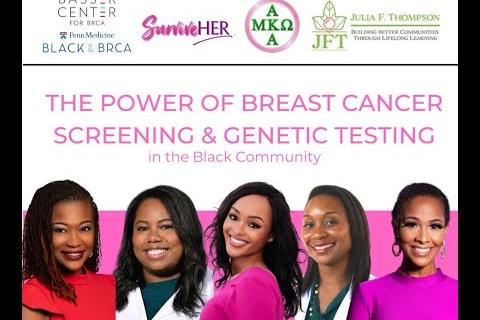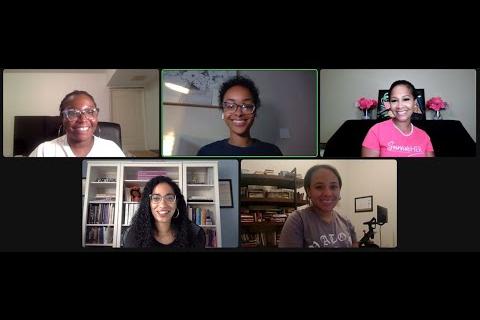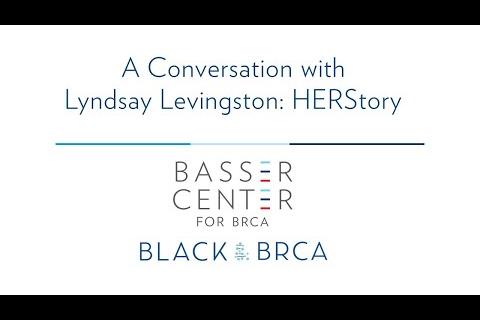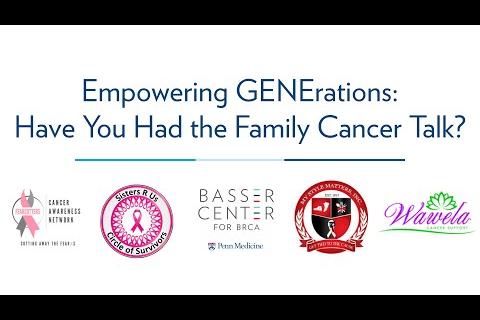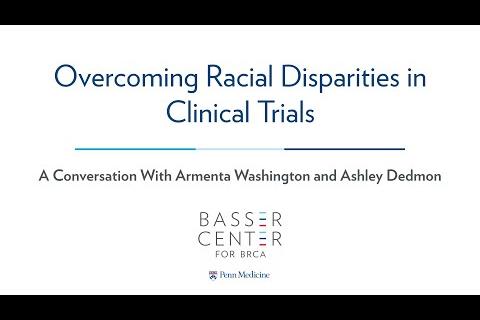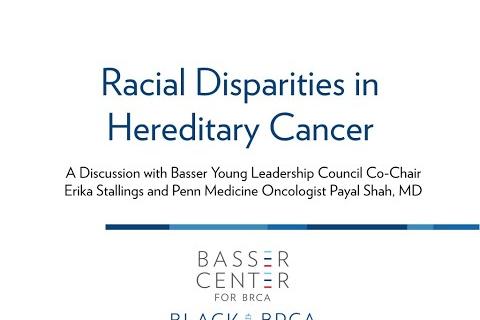
Black & BRCA is a collaboration between the Basser Center for BRCA and its team of patient advocates, researchers and healthcare professionals to bring tailored resources and support to the Black community. At a time when Black men and women are more likely than the general population to be diagnosed with cancer at later stages when it is less treatable, Black & BRCA seeks to empower individuals to understand their family health history and take action to prevent cancer from one generation to the next.

Educational Resources
- Black & BRCA partner, Touch4Life, hosted a #BlackGenesMatter Panel Discussion Video
- Breast Believe Provides Resources to Organizations Prioritizing Breast Cancer Awareness - Especially in Historically Underserved Communities
- Black & BRCA Campaign Poster
- Common Myths About Cancer and Genetics
- Collect Your Family Cancer History Form
- BRCA in Men Fact Sheet
- Basser Mastectomy Surgery Advice Checklist
- Support and Resources
Black & BRCA in the News
- Emerging from the Chrysalis: Patient Advocate Jamil Rivers Leads Women of Color to Better Breast Cancer Care
- How A Genetic Test Saved This Black Woman’s Life
- Black and White Women Have Same Mutations Linked to Breast Cancer Risk
- Race Has No Place in Precision Oncology
- Disparities in Genetic Testing for Cancer Susceptibility
- Raising Awareness of Breast Cancer in the Black Community: A Discussion with Jamila Kinsey
- Why Maya Rockeymoore Cummings Began Her Congressional Campaign with a Double Mastectomy
- Beyoncé’s Dad Has a Mutation More African-Americans Should Be Tested For
- Why Breast Cancer Patients Should Know Their Options for Reconstruction After Surgery
Ashley's Basser Family Story
Ashley Dedmon, MPH, CHES, one of our Basser Center YLC members and Black & BRCA partners, shares why our endless work means so much to her and her family.
The Power of Breast Cancer Screening & Genetic Testing in the Black Community
The Basser Center for BRCA's Black & BRCA initiative teamed up with Alpha Kappa Alpha Sorority, Incorporated (AKA) for their Breast Cancer Awareness Impact Day to discuss the importance of both mammogram screening and genetic testing within the black community.
Family Reunions: The Family Health History Conversation
In honor of Black Family Cancer Awareness Week, The Basser Center’s Black & BRCA initiative held a virtual panel discussion focused on the importance of having the family cancer history conversation. Hear from breast cancer previvor Erika Stallings, breast cancer survivors Lyndsay Levingston, and Mica Anders, and Penn Medicine clinical research nurse Jessica Savage-Jones. The discussion will be moderated by Basser Young Leadership Council member Ashley Dedmon.
HERStory: A Conversation with Lyndsay Levingston
In recognition of the Black History Month, the Basser Center shares Lyndsay Levingston’s story as a Black women who is also a BRCA mutation carrier and breast cancer survivor. As an advocate and supporter of women who have been diagnosed with breast cancer, Lyndsay founded SurviveHER, an organization that helps women be informed, inspired and empowered through their journey.
Empowering GENErations: Have You Had the Family Cancer Talk?
During this virtual panel in September 2021 we featured Black families impacted by BRCA-related cancer in discussion with a Basser Center genetic counselor. Presented in collaboration with the Basser Center’s Black & BRCA initiative, Cancer Awareness Network, Sisters R Us Circle of Survivors, My Style Matters, and Wawela Cancer Support
In June 2021, the Basser Center's Black & BRCA initiative presented a virtual panel about discussing hereditary cancer with your family. Moderated by Black & BRCA cofounder Erika Stallings, the panel includes Basser oncologist Payal Shah, MD, Houston Methodist Sugar Land/West genetic counselor Tiffiney G. Carter, MS, CGC, and Basser Young Leadership Council member Ashley Dedmon.
Overcoming Racial Disparities in Clinical Trials
Learn more about racial disparities in hereditary cancer clinical trials in this discussion presented by the Basser Center for BRCA’s Black & BRCA initiative. This conversation features Ashley Dedmon, a patient advocate and member of the Basser Young Leadership Council, and Armenta Washington, a Senior Research Coordinator at Penn Medicine’s Community Outreach and Engagement Program.
Racial Disparities in Hereditary Cancer
Basser Young Leadership Council co-chair and patient advocate Erika Stallings discusses racial disparities in hereditary cancer, BRCA mutations in the Black community, and more with Basser Center scientist and Penn Medicine medical oncologist Payal Shah, MD.
About the Basser Center

Founded in 2012 by Penn alumni, Mindy and Jon Gray, the Basser Center for BRCA at Penn Medicine's Abramson Cancer Center is the first comprehensive center for the research, treatment, and prevention of BRCA-related cancers. Devoted to advancing care for people affected by BRCA gene mutations, the Basser Center's unique model provides funding for collaborative research, education and outreach programs around the world. The Basser Center's mission is to see a world free of the devastating effects of BRCA-related cancers and, in doing so, provide a roadmap for curing genetic diseases.

